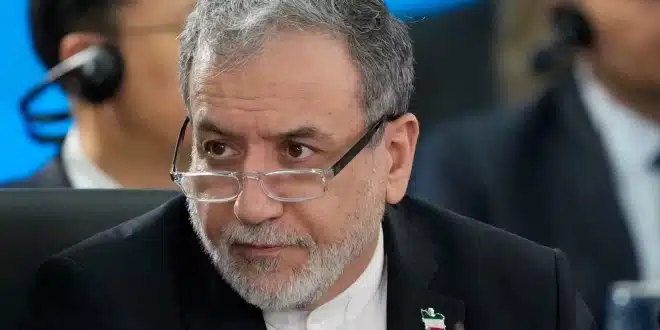Iran has reaffirmed its commitment to continuing its nuclear program, including uranium enrichment, even after recent U.S. military strikes inflicted substantial damage on key nuclear sites. Speaking ahead of a diplomatic meeting with European powers, Iranian Foreign Minister Abbas Araghchi emphasized that while the strikes had temporarily halted enrichment activities due to the severity of the damage, Iran has no intention of abandoning its nuclear ambitions.
“Enrichment is currently paused because the damage was indeed serious,” Araghchi stated in an interview with Fox News. “But we will not relinquish this effort—it is a product of our scientists’ hard work and a symbol of national pride.”
His remarks come ahead of crucial talks scheduled for Friday in Istanbul, where Iran will meet with representatives from Britain, France, and Germany to discuss the future of the 2015 nuclear agreement. That deal, formally known as the Joint Comprehensive Plan of Action (JCPOA), was designed to limit Iran’s nuclear capabilities in exchange for the lifting of international sanctions.
Fallout from the 2015 Agreement and U.S. Withdrawal
The nuclear accord, which involved Iran and the five permanent members of the UN Security Council plus Germany, began unraveling in 2018 when then-U.S. President Donald Trump unilaterally pulled Washington out and reimposed sweeping sanctions on Tehran. While European signatories pledged to uphold the deal, their efforts to circumvent U.S. sanctions—such as through a special financial mechanism—largely failed, forcing many companies to cut ties with Iran.
In response, Tehran began gradually rolling back its compliance with the agreement, prompting fresh concerns from Western powers. Foreign ministry spokesperson Esmaeil Baqaei placed blame squarely on Europe, saying, “Iran holds the European parties accountable for their failure to uphold the agreement.”
Rising Tensions and the Path to Diplomacy
The upcoming Istanbul meeting follows a 12-day conflict between Israel and Iran in June, which saw Israel launch surprise airstrikes on several Iranian military and nuclear targets. The United States followed suit with coordinated strikes on June 22, targeting uranium enrichment and nuclear facilities in Fordo, Isfahan, and Natanz.
These developments have heightened tensions, with Baqaei warning of a “dangerous escalation” if diplomatic efforts falter. He also stated that Iran has “no intention of speaking with America at this time,” citing the collapse of five previous rounds of talks and the fallout from Israeli strikes.
Parallel to the European negotiations, Iran is also set to host a trilateral summit with Chinese and Russian officials this week to explore alternatives and discuss sanctions relief. China, which maintains a close diplomatic relationship with Tehran, pledged to play a “constructive role” in reviving dialogue and addressing all parties’ security concerns.
Snapback Sanctions and a Tight Deadline
Germany has indicated that the Istanbul discussions will be held at the expert level, noting that the European trio—known as the E3—is working intensely to find a long-term, verifiable solution. However, time is running out. A clause in the original 2015 accord allows any signatory to trigger a “snapback” of UN sanctions if Iran is found to be in non-compliance. That mechanism remains on the table, with Germany warning that if no breakthrough is reached by the end of August, snapback sanctions could be invoked. Complicating matters further, the nuclear deal is set to expire in October.
Baqaei has called such a move “unjustified, meaningless, and immoral,” arguing that Iran’s reduced commitments were permitted within the deal itself and only enacted after Western nations failed to deliver on their end.
Enrichment Levels Raise Alarm
Adding to international alarm, the International Atomic Energy Agency has confirmed that Iran is enriching uranium to 60% purity—well above the 3.67% limit set under the JCPOA and just below the 90% threshold required to produce a nuclear weapon. Although Iran insists its program remains peaceful and civilian in nature, many Western powers, particularly the U.S. and Israel, remain unconvinced.
While Iran continues to deny any intention of developing nuclear weapons, the rising enrichment levels and damaged diplomatic channels suggest a volatile period ahead. Without swift progress in negotiations, the risk of further escalation—and potentially open conflict—remains high.


